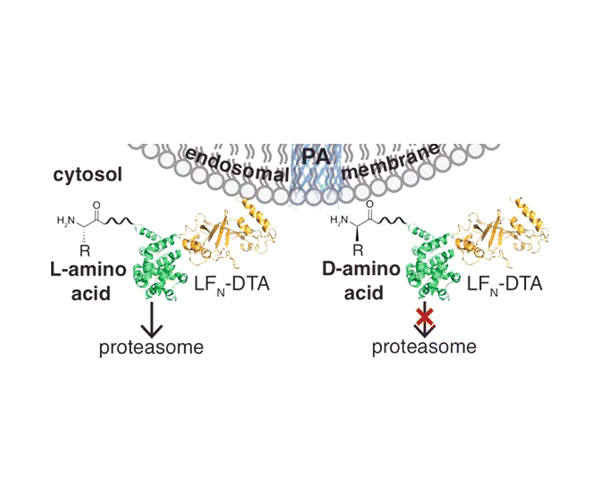A d-Amino Acid at the N-Terminus of a Protein Abrogates Its Degradation by the N-End Rule Pathway
Eukaryotes have evolved the ubiquitin (Ub)/proteasome system to degrade polypeptides. The Ub/proteasome system is one way that cells regulate cytosolic protein and amino acids levels through the recognition and ubiquitination of a protein’s N-terminus via E1, E2, and E3 enzymes. The process by which the N-terminus stimulates intracellular protein degradation is referred to as the N-end rule. Characterization of the N-end rule has been limited to only the natural l-amino acids. Using a cytosolic delivery platform derived from anthrax lethal toxin, we probed the stability of mixed chirality proteins, containing one d-amino acid on the N-terminus of otherwise all l-proteins. In all cases, we observed that one N-terminal d-amino acid stabilized the cargo protein to proteasomal degradation with respect to the N-end rule. We found that since the mixed chirality proteins were not polyubiquitinated, they evaded N-end-mediated proteasomal degradation. Evidently, a subtle change on the N-terminus of a natural protein can enhance its intracellular lifetime.
Pentelute Lab, MIT, Publications,
15784
wp-singular,portfolio_page-template-default,single,single-portfolio_page,postid-15784,wp-theme-bridge,bridge-core-3.0.1,qode-page-transition-enabled,ajax_fade,page_not_loaded,,paspartu_enabled,paspartu_on_top_fixed,paspartu_on_bottom_fixed,qode_grid_1200,qode_popup_menu_push_text_top,qode-theme-ver-28.7,qode-theme-bridge,disabled_footer_top,wpb-js-composer js-comp-ver-6.8.0,vc_responsive
A d-Amino Acid at the N-Terminus of a Protein Abrogates Its Degradation by the N-End Rule Pathway
A d-Amino Acid at the N-Terminus of a Protein Abrogates Its Degradation by the N-End Rule Pathway
Published on November 11 2015
Amy E. Rabideau and Bradley L. Pentelute*
Abstract
Eukaryotes have evolved the ubiquitin (Ub)/proteasome system to degrade polypeptides. The Ub/proteasome system is one way that cells regulate cytosolic protein and amino acids levels through the recognition and ubiquitination of a protein’s N-terminus via E1, E2, and E3 enzymes. The process by which the N-terminus stimulates intracellular protein degradation is referred to as the N-end rule. Characterization of the N-end rule has been limited to only the natural l-amino acids. Using a cytosolic delivery platform derived from anthrax lethal toxin, we probed the stability of mixed chirality proteins, containing one d-amino acid on the N-terminus of otherwise all l-proteins. In all cases, we observed that one N-terminal d-amino acid stabilized the cargo protein to proteasomal degradation with respect to the N-end rule. We found that since the mixed chirality proteins were not polyubiquitinated, they evaded N-end-mediated proteasomal degradation. Evidently, a subtle change on the N-terminus of a natural protein can enhance its intracellular lifetime.
Category
2015, Publications





